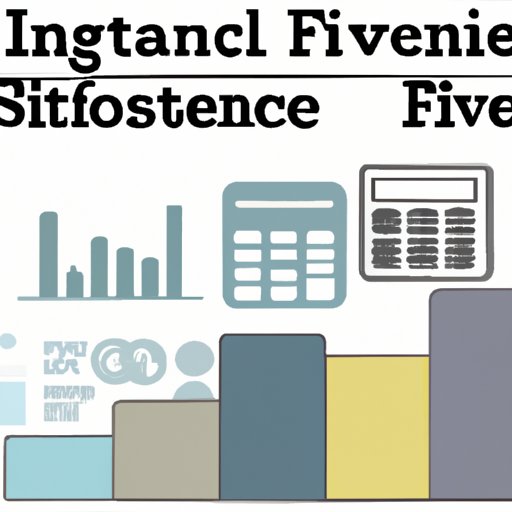Introduction
Making sound financial decisions is an important part of achieving long-term financial security. For many people, it can be difficult to navigate the complexities of investing and managing their finances. This is where a financial advisor can be helpful. A financial advisor can provide invaluable guidance in helping you make smart decisions about your money.
The purpose of this article is to explore the benefits of having a financial advisor and provide recommendations on when to get professional advice. We will evaluate your financial goals and assess your financial knowledge and comfort level with investing. We will also analyze the costs of working with a financial advisor and consider your age, income and life circumstances.

Exploring the Benefits of Having a Financial Advisor
Having a financial advisor can provide a variety of benefits, including increased financial security, improved investment strategies and returns, and access to professional advice.
Increased Financial Security
A financial advisor can help you develop a plan to achieve your long-term financial goals. They can help you set realistic goals and provide guidance on how to best reach them. This can lead to increased financial security by providing you with peace of mind knowing that you are taking the right steps to protect your financial future.
Improved Investment Strategies and Returns
Financial advisors can help you develop an investment strategy that is tailored to your needs and risk tolerance. They can provide guidance on which investments are best suited for you and help maximize your returns. According to a survey conducted by the Investment Company Institute, investors who used a financial advisor reported higher returns than those who managed their own investments.
Access to Professional Advice
Financial advisors can provide valuable insight into the financial markets and help you make informed decisions. They can provide guidance on a range of topics, from retirement planning to estate planning. They can also help you stay up-to-date on changes in the financial markets and provide advice on how to best manage your money.
Evaluating Your Financial Goals and Deciding When to Get Professional Advice
When considering whether or not to work with a financial advisor, it’s important to evaluate your financial goals and decide when to get professional advice. This will help you determine if a financial advisor is right for you.
Assessing Your Long-Term Financial Goals
Before deciding to work with a financial advisor, it’s important to assess your long-term financial goals. Are you looking to build wealth, save for retirement, or purchase a home? These are all important questions to ask yourself before making a decision. A financial advisor can help you develop a plan to achieve these goals and provide guidance on how to best reach them.
Identifying Short-Term Financial Goals
It’s also important to identify short-term financial goals. Are you looking to pay off debt, save for a vacation, or invest in stocks? A financial advisor can help you develop a plan to reach these goals and provide guidance on how to best manage your money.
Considering Your Current Financial Situation
Finally, it’s important to consider your current financial situation. Are you comfortable managing your investments on your own or do you need assistance? Do you have the time and resources to manage your finances effectively? Answering these questions can help you decide if working with a financial advisor is right for you.

Understanding the Different Types of Financial Advisors and Their Services
There are a variety of financial professionals available to help you manage your finances. It’s important to understand the different types of financial advisors and their services to determine which one is right for you.
Certified Financial Planners
Certified Financial Planners (CFPs) are trained professionals who are certified by the CFP Board of Standards. They specialize in providing comprehensive financial planning services, including developing investment strategies, retirement planning, tax planning, and estate planning. They can provide guidance on a range of financial topics and help you make informed decisions.
Chartered Financial Analysts
Chartered Financial Analysts (CFAs) are trained professionals who specialize in analyzing investments and providing financial advice. They are knowledgeable in a variety of areas, including portfolio management, investment analysis, and financial modeling. They can provide guidance on a range of financial topics and help you develop an investment strategy that is tailored to your needs.
Other Financial Professionals
In addition to CFPs and CFAs, there are other financial professionals available to help you manage your finances. These include accountants, insurance agents, stockbrokers, and financial planners. Each of these professionals has specialized knowledge and can provide valuable guidance in helping you make informed decisions.

Assessing Your Financial Knowledge and Comfort Level with Investing
It’s also important to assess your financial knowledge and comfort level with investing. Do you have the time to manage your investments? Are you willing to take on risk? What is your level of financial literacy? Answering these questions can help you decide if working with a financial advisor is right for you.
Do You Have the Time to Manage Your Investments?
Investing requires a significant amount of time and effort. If you don’t have the time to devote to managing your investments, then working with a financial advisor may be beneficial. A financial advisor can provide guidance on how to best manage your investments and provide valuable insight into the financial markets.
Are You Willing to Take on Risk?
Investing involves taking on some level of risk. It’s important to understand your risk tolerance and be comfortable with the level of risk you’re taking on. A financial advisor can help you develop an investment strategy that is tailored to your risk tolerance and help you make informed decisions.
What Is Your Level of Financial Literacy?
It’s also important to evaluate your level of financial literacy. Do you have a basic understanding of financial concepts such as stocks, bonds, and mutual funds? A financial advisor can help you gain a better understanding of these concepts and help you make informed decisions.
Analyzing the Costs of Working with a Financial Advisor
When considering working with a financial advisor, it’s important to understand the costs associated with their services. There are a variety of fees and commissions that may be charged, so it’s important to understand what you’re paying for.
Fees for Services
Financial advisors typically charge fees for their services. These fees can vary based on the type of services provided, the complexity of the advice, and the amount of assets being managed. It’s important to understand the fees that are being charged and how they compare to other advisors.
Commissions and Transaction Fees
Some financial advisors may charge commissions for buying and selling investments. These commissions can vary based on the type of investments being purchased and the amount of money being invested. It’s important to understand the commissions that are being charged and how they compare to other advisors.
Additional Costs
In addition to fees and commissions, there may be additional costs associated with working with a financial advisor. These can include administrative fees, research fees, and technology fees. It’s important to understand all the costs associated with working with a financial advisor and make sure they are reasonable.
Considering Your Age, Income and Life Circumstances
When considering working with a financial advisor, it’s important to consider your age, income and life circumstances. These factors can help you determine if a financial advisor is right for you.
Are You Just Starting Out in Your Career?
If you’re just starting out in your career, it may be beneficial to work with a financial advisor. They can help you develop a plan to reach your long-term financial goals and provide guidance on how to best manage your money. A financial advisor can also help you make informed decisions about your investments.
Are You Retiring or Planning for Retirement?
If you’re retiring or planning for retirement, it’s important to have a financial plan in place. A financial advisor can help you develop a plan to reach your retirement goals and provide guidance on how to best manage your money. They can also provide advice on estate planning and tax planning.
Do You Have Dependents?
If you have dependents, it’s important to have a financial plan in place. A financial advisor can help you develop a plan to provide for your dependents and provide guidance on how to best manage your money. They can also provide advice on college savings plans and life insurance.
Conclusion
Having a financial advisor can provide a variety of benefits, including increased financial security, improved investment strategies and returns, and access to professional advice. It’s important to evaluate your financial goals and assess your financial knowledge and comfort level with investing. It’s also important to understand the different types of financial advisors and their services, as well as the associated costs. Finally, it’s important to consider your age, income and life circumstances when deciding if working with a financial advisor is right for you.
In summary, working with a financial advisor can provide invaluable guidance in helping you make smart decisions about your money. A financial advisor can help you develop a plan to achieve your long-term financial goals, provide guidance on which investments are best suited for you, and help you make informed decisions about your money. Ultimately, the decision to work with a financial advisor is a personal one, and should be based on your individual financial goals and circumstances.
(Note: Is this article not meeting your expectations? Do you have knowledge or insights to share? Unlock new opportunities and expand your reach by joining our authors team. Click Registration to join us and share your expertise with our readers.)
